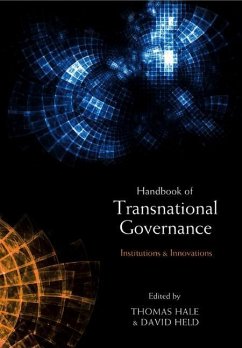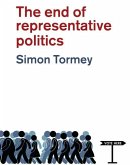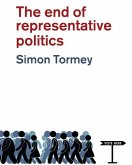When we speak of global governance today, we no longer mean simply state-to-state diplomacy, international treaties, or intergovernmental organizations like the United Nations. Alongside these 'traditional' elements of global politics are a host of new institutions ranging from global networks of governmental officials, to private codes of conduct for corporations, to action-oriented partnerships of NGOs, governments, corporations, and other actors. These innovative mechanisms offer intriguing solutions to pressing transnational challenges as diverse as climate change, financial governance, workers' rights, and public health. But they also raise new questions about the effectiveness and legitimacy of transnational governance.
An expanding body of scholarship has sought to identify and assess these new forms of governance, but this young body of work has lacked a sense of the larger picture. This volume seeks to fill that need by presenting a comprehensive overview of new forms of transnational governance. This resource is essential for those who want to explain why transborder governance has changed and to understand what implications these changes have for global politics.
Hinweis: Dieser Artikel kann nur an eine deutsche Lieferadresse ausgeliefert werden.
An expanding body of scholarship has sought to identify and assess these new forms of governance, but this young body of work has lacked a sense of the larger picture. This volume seeks to fill that need by presenting a comprehensive overview of new forms of transnational governance. This resource is essential for those who want to explain why transborder governance has changed and to understand what implications these changes have for global politics.
Hinweis: Dieser Artikel kann nur an eine deutsche Lieferadresse ausgeliefert werden.
"A comprehensive starting-point for understanding the complex array of organizations, associations, and networks engaged in contemporary transnational governance. It shows us much about what we know and don't know - particularly about the impact of these novel arrangements. This volume can help to set the agenda for a new generation of scholarship on the politics of complex interdependence." -- Robert O. Keohane, Princeton University
"The configuration of a multipolar world without the tools to fuel transnational efficiency and legitimacy is highly risky. This brilliant and comprehensive volume enriches previous research on the transformations of governance in the international community and it is essential for those seeking to understand the challenges ahead and their impact on world politics." -- Javier Solana, President of ESADE Center for Global Economy and Geopolitics, former EU High Representative for the Common Foreign and Security Policy
"An indispensable reference for anyone interested in global cooperation and problem-solving in the 21st century. By documenting multiple forms of transnational governance, from transgovernmental networks to multi-stakeholder coalitions to voluntary codes of conduct, the book describes a growing global infrastructure of regulation and enforcement. The authors also include arbitral bodies, which undergird a public-private system of law enforcement that is familiar to lawyers but is all too often left out by political scientists. I can't imagine anyone teaching or writing about this subject without consulting this book." -- Anne-Marie Slaughter, Princeton University, former Director of Policy Planning, US State Department
"The configuration of a multipolar world without the tools to fuel transnational efficiency and legitimacy is highly risky. This brilliant and comprehensive volume enriches previous research on the transformations of governance in the international community and it is essential for those seeking to understand the challenges ahead and their impact on world politics." -- Javier Solana, President of ESADE Center for Global Economy and Geopolitics, former EU High Representative for the Common Foreign and Security Policy
"An indispensable reference for anyone interested in global cooperation and problem-solving in the 21st century. By documenting multiple forms of transnational governance, from transgovernmental networks to multi-stakeholder coalitions to voluntary codes of conduct, the book describes a growing global infrastructure of regulation and enforcement. The authors also include arbitral bodies, which undergird a public-private system of law enforcement that is familiar to lawyers but is all too often left out by political scientists. I can't imagine anyone teaching or writing about this subject without consulting this book." -- Anne-Marie Slaughter, Princeton University, former Director of Policy Planning, US State Department








